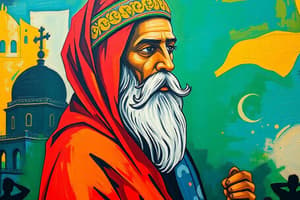Podcast
Questions and Answers
What is the estimated number of followers of Islam worldwide?
What is the estimated number of followers of Islam worldwide?
- 1.8 billion (correct)
- 1.5 billion
- 1 billion
- 2 billion
In what year did the prophet Muhammad begin receiving revelations from the angel Gabriel?
In what year did the prophet Muhammad begin receiving revelations from the angel Gabriel?
- 570 CE
- 550 CE
- 610 CE (correct)
- 590 CE
How many chapters (surahs) are there in the Quran?
How many chapters (surahs) are there in the Quran?
- 114 (correct)
- 100
- 110
- 112
Which of the following is not a period of Islamic history?
Which of the following is not a period of Islamic history?
Which of the following is not a source of Islamic law (Sharia)?
Which of the following is not a source of Islamic law (Sharia)?
Which of the following is not one of the Five Pillars of Islam?
Which of the following is not one of the Five Pillars of Islam?
What was the name of the angel who delivered revelations to the prophet Muhammad?
What was the name of the angel who delivered revelations to the prophet Muhammad?
During which period of Islamic history did the Rashidun Caliphs rule?
During which period of Islamic history did the Rashidun Caliphs rule?
What is the name of the holy book of Islam?
What is the name of the holy book of Islam?
Which of the following is not a major period of the Ottoman Empire?
Which of the following is not a major period of the Ottoman Empire?
Flashcards are hidden until you start studying
Study Notes
Islam
Islam is one of the world's major religions with over 1.8 billion followers worldwide. It was founded around 610 CE in Arabia by the prophet Muhammad, who received divine revelations through the angel Gabriel until his death in 632 CE. These revelations form the basis of the Quran, which Muslims believe is the literal word of God as revealed to Muhammad. The Quran consists of 114 chapters, known as "surahs," and was written in classical Arabic.
Prophet Muhammad
Muhammad was born around 570 CE in Mecca, Saudi Arabia. He began receiving revelations from the angel Gabriel when he was about 40 years old. These revelations continued until his death at the age of 63. Muhammad's teachings, which were compiled in the Quran, form the basis of Islamic beliefs and practices.
Islamic History
Islamic history can be divided into several periods:
- The period of Muhammad's life, known as the Prophetic Era, which lasted from 610 to 632 CE.
- The period of the Rashidun Caliphs, also known as the Rightly Guided Caliphs, which lasted from 632 to 661 CE.
- The period of the Umayyad Caliphs, which lasted from 661 to 750 CE.
- The period of the Abbasid Caliphs, which lasted from 750 to 1258 CE.
- The Ottoman Empire, which lasted from 1299 to 1918 CE.
Islamic Law
Islamic law, also known as Sharia law, is a set of legal principles based on the Quran and the teachings of Muhammad. It covers all aspects of life, including criminal law, civil law, and religious law. Islamic law is divided into five main schools, known as the madhabs:
- Hanafi
- Maliki
- Shafi'i
- Hanbali
- Ja'fari
Five Pillars of Islam
The five pillars of Islam, which form the foundation of Muslim belief and practice, are:
- Shahada - The declaration of faith in God and Muhammad as his messenger, "There is no god but Allah, and Muhammad is his messenger."
- Salah - Daily prayer, performed at specific times of the day.
- Zakat - Charity given to those who need it.
- Sawm - Fasting during the month of Ramadan.
- Hajj - Pilgrimage to Mecca at least once in a lifetime for those who can afford it and have the physical ability to do so.
Studying That Suits You
Use AI to generate personalized quizzes and flashcards to suit your learning preferences.




